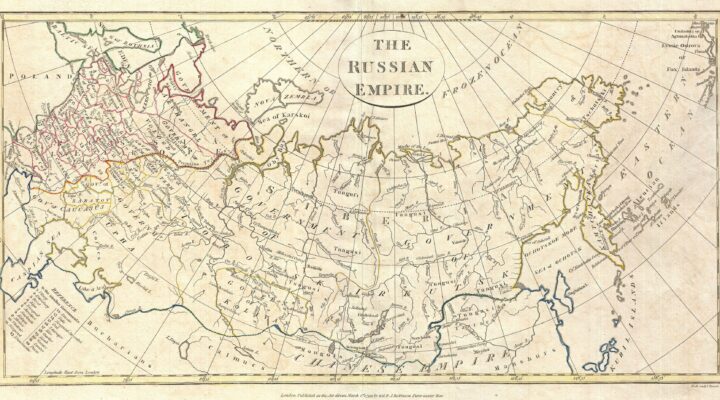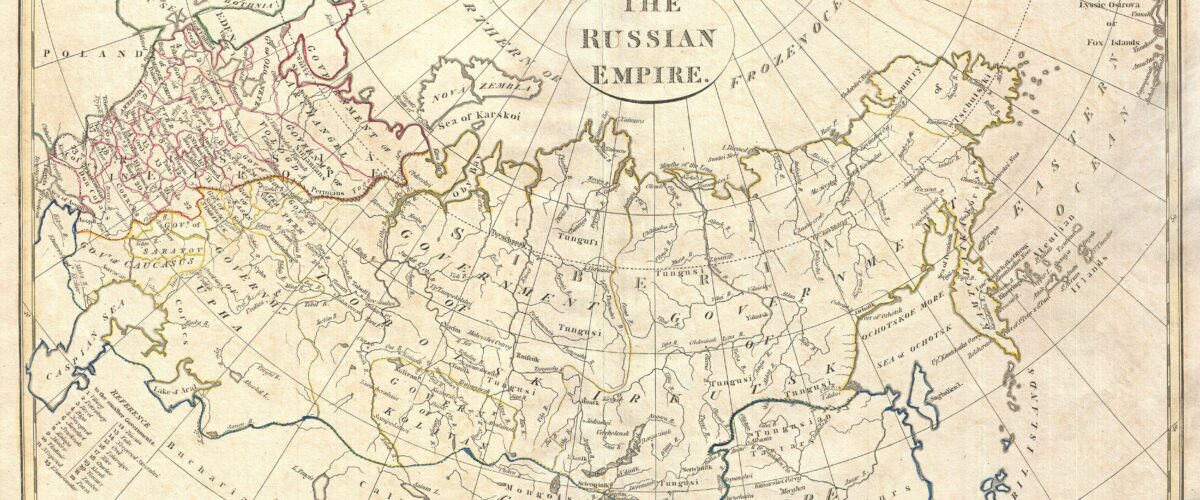If you’re like me, you’ve spent the past month reading articles, listening to podcasts and devouring cable news in a desperate attempt to understand the horrors unfolding in Ukraine. My ignorance remains vast, but I’ve learned a lot about post-Soviet Russia, the Ukrainian Maidan (or revolution of dignity), and the fraught relationship between secular politicians and the Russian Orthodox Church.
Spiritual fascism
After conducting a thorough review of the Russian leader’s decision-making and public statements, Timothy Snyder concluded that Vladimir Putin’s primary inspiration is the Russian fascism of Ivan Ilyin. Ilyin fled the Soviet Union after the Bolshevik Revolution, taking refuge in Berlin. He became infatuated with the fascist philosophy and strongman posturing of Benito Mussolini and Adolf Hitler.
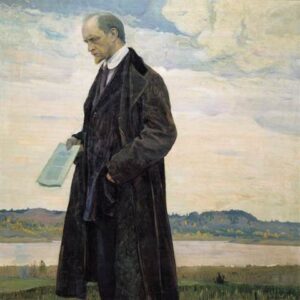
Nesterov Ilyin
After the Soviet victory over the Axis forces, Ilyin dreamed of a future fascist revolution in his native Russia, a nation he believed to be perfectly suited to such an enterprise. His criticism of German and Italian fascism was in the hope that, someday, it would be done right in the land of his birth. Anton Barbashin has called Ilyin a “fashionable fascist” who believed the common people must kneel before the national vozhd (Russian for “dictator”).
It would be simplistic to see Ilyin as Putin’s sole mentor (he also has expressed appreciation for Vladimir Sergeyevich Solovyov, Lev Gumilev, and Nikolai Berdyaev, for instance). Still, the influence of “the fashionable fascist” on Putin’s thinking is hard to deny.
In 2005, Snyder says, Putin began citing Ilyin all the time, even calling him the “Kremlin court philosopher.” Putin’s political ally, Dmitry Medvedev, has recommended Ilyin’s work for Russian youth, and many stories based on his ideas in mind dominate Russian television.
Snyder is frequently accused of exaggeration and alarmism, particularly by those eager to maintain cordial relations between Russia and the West. But Putin’s blatant attempt to drag Ukraine back into the Russian fold is justifying the distinguished Yale professor’s worst fears. When the house is on fire, alarmists come in handy.
The authors Putin quotes most frequently share a common belief in Russian exceptionalism. God’s plans for the world, they believe, focus on Russia.
“The authors Putin quotes most frequently share a common belief in Russian exceptionalism. God’s plans for the world, they believe, focus on Russia.”
When Putin speaks of “Russia,” he has in mind the expansive borders of 18th century Imperial Russia, a concept known as “the Russian World,” or Russkiy mir. Apart from Russia, Putin believes, Ukraine is an illusion. There is no invasion because, in the eyes of God, Russia and Ukraine are one people. The only way to heal the world, it follows, is to return to God’s original intention for a Russia that is pure and unified. Anything short of this constitutes a rebellion against a divine mandate.
The brutal cast of Imperial logic
Putin sees the Imperial Russia of Peter the Great (1672-1725) as a golden age. Subsequent developments are thus illegitimate, even unreal. According to Masha Gessen, Putin celebrates “a series of great, brutal, expansionist dictators”: Ivan the Terrible, Peter the Great, Joseph Stalin, and, in the fulness of time, himself.
The appropriately named Ivan the Terrible (1547-1584) had been a national embarrassment until Putin engineered a rehabilitation project. Ivan was vicious and cruel, but he transformed Russia from a Medieval state into a vast empire.
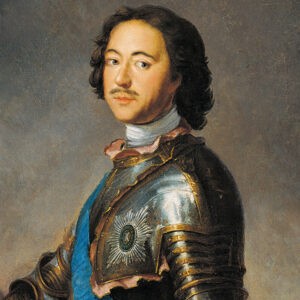
Peter the Great
Peter the Great (1672-1725) also was a brutal tyrant, but he dragged Russia into the modern world. Stalin murdered between 2 and 3 million Russians and intentionally starved 4 million Ukrainian citizens to death, but he rallied the Soviet Union against Hitler’s armies.
But in Putin’s mind, Peter the Great and Stalin are the stars shining most brightly in the Russian firmament. Stalin once was remembered by Russians with fear and contempt, but his popularity has been rapidly rising. Stalin currently enjoys 70% approval rating in Russia.
Not surprisingly, only 14% of Ukrainians hold Stalin in high regard. Stalin didn’t simply create an artificial famine, he ordered that no nutrients should enter the affected region and refused to allow desperate peasants to flee for safety. Anne Applebaum’s Red Famine drew attention to this horror show in 2017.
Stalin came to power as an atheist dedicated to “the complete annihilation of religious institutions and ideas.” But with German armies sweeping across Soviet Russia, the Man of Steel empowered what remained of the church in a desperate attempt to fan the fires of patriotism. From that time forward, the Orthodox Church became a barely tolerated tool of the state. Patriarch Kirill, the current leader of Russian Orthodoxy, worked as both priest and KGB agent prior to the collapse of the Soviet Union.
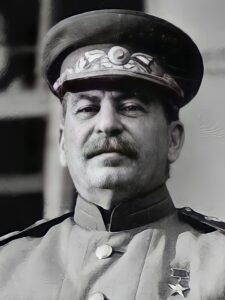
Joseph Stalin
Putin lives in the moral world of the 18th century, a time when the right of powerful nations to despoil weaker neighbors largely was taken for granted. According to Gessen, Putin has endorsed a “pre-modern logic of how a ruler should act and what is right and reasonable for a ruler to do.” His willingness to demolish cities, targeting nurseries, schools and hospitals, may offend modern sensibilities, but for Ivan, Peter and Stalin, state-sponsored terrorism was standard operating procedure.
“Peter the Great was the first Bolshevik,” the Russian poet Maximilian Voloshin wrote. “He, as we, knew of no means different from decree, execution and the torture chamber, to realize Truth on earth.”
In Ukraine, Putin is expressing his agreement with this sentiment. We may burn the world to ash, the reasoning goes, but something wonderful will rise from the ashes.
A church in chains
Ater three decades of freedom from the Soviet yoke, the Russian Orthodox Church remains weak. While a 2014 Pew survey found that, although 72% of the Russian population was nominally Orthodox, only 56% of Russians professed belief in God, (compared to 86% of Ukrainians).
That’s progress. In 1991, only 38% of Russians believed in God. Only 7% of Russians attend worship at least once a month, compared to 35% in Ukraine.
Kirill is determined to make Russian Orthodoxy as central to Russian identify as it was before the creation of the Soviet Union in 1922. With Putin’s blessing, religious instruction is now part of the Russian school curriculum, and the Russian military is served by Orthodox chaplains.
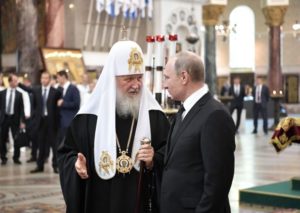
Vladimir Putin with Russian Orthodox Patriarch Kirill in 2019.
Kirill has profited handsomely from his “reform” efforts. According to some reports, his personal wealth is now north of $4 billion. That hardly compares with the $200 billion Putin is reputed to control, but it isn’t too much of a stretch to call Kirill a spiritual oligarch.
For Putin, western pluralist democracy is the enemy. He sees himself as the vozhd, the strongman, whose every whim takes on the character of law. In Russia, therefore, the rule of law is a myth. In Chechnya, Georgia, Crimea and Syria, Putin has demonstrated his faith in the utility of violence. Those who refer to the rape of Ukraine as an act of war are being sent to prison. Reality is whatever Putin declares it to be. That may not satisfy the textbook definition of “fascism,” but it’s close enough.
The frustrated glory of pluralist democracy
Christian nationalists in America are far more restrained by political reality than Putin. But America would look a lot like Putin’s Russia if religious zealots got their way in this wicked world. Their utopian vision for America leaves no room for pluralist democracy. Free and fair elections always will frustrate the Christian nationalist vision. Which is why our electoral process is under siege from the right.
In Putin’s Russia, the LGBTQ community, ethnic minorities and social reformers are either imprisoned, brutalized or ignored. America’s Christian nationalists would follow Putin’s lead if they could. It’s the only pathway to success.
To force their will on an unwilling population, American Christian nationalists must clear two hurdles. First, they must replace pluralist democracy with autocratic theocracy. Second, they must sort out their internal differences.
“Religious diversity and theocracy cannot coexist.”
Religious diversity and theocracy cannot coexist. Only one expression of conservative religion could prevail. The only practical solution would be a marriage of convenience between a religious boss, like Patriarch Kirill, and a political boss like Putin. The result, as the sordid relationship between Jerry Falwell Jr. and Donald Trump makes clear, would inevitably be a contorted spiritual burlesque.
Religious and political progressives work under similar limitations. Champions of Western democracy have long assumed that the door to their version of America will swing open on the greased hinges of inevitability. It won’t. There always will be Christian nationalists, and there always will be progressive reformers, and there always will be a huge mass of folks who are just trying to pay the bills and have a little fun on the weekend.
Either we learn to live together, or some species of fascism awaits.
This collision of interests (and disinterests) gives pluralist democracy its messy, maddening quality. At best, it delivers unsatisfying half-measures. No matter where you stand, there will be millions of voters who think you’re crazy, and millions more who aren’t paying attention.
Progressives think they will be rescued from this fate by shifting demographics. It won’t happen.
Christian nationalists are looking for a religious revival to sweep the nation back to an imagined golden age. It ain’t happening. Failing that, they’re praying for the rapture. That’s not in the cards either.
Sorry, folks; either we’re stuck with each other, or the shooting starts.
“Sorry, folks; either we’re stuck with each other, or the shooting starts.”
Putin’s pet philosophers provide a thin veneer of justification for his personal ambitions. We suffer from the same malady. Christian nationalists want to criminalize history. Some of my progressive friends are so immobilized by horrors of the past they can’t see a way forward. Folks on both sides are all too ready to burn the house down.
Utopia-or-bust thinking is killing us. America has been, and will remain, a study in contradiction. We are divided, conflicted and hopelessly confused. And nobody’s going to fix that in your lifetime or mine.
But if you want to check out the alternative, book a flight to Kyiv. The Ukrainians have only three decades of experience with pluralist democracy, but they are fighting to the death to keep it. They have known more than their share of corruption, incompetence and gridlock. But staring down the barrel of a tank puts things in proper perspective.
Fully aware of the downside, the people of Ukraine crave what we have. The alternative is living with the romantic nightmare Putin has on offer.
If we really want to help the brave people of Ukraine, we need to face the harsh reality of America. None of us gets our way. Isn’t it glorious?
Alan Bean is executive director of Friends of Justice, an alliance of community members that advocates for criminal justice reform. He lives in Arlington, Texas.
Related articles:
Why is Russia’s Putin talking about marriage and faith in God? | Opinion by Andrey Shirin
Let’s be clear: Putin’s invasion of Ukraine is not about the rapture and Russia in biblical prophecy | Analysis by Rodney Kennedy
Don’t forget the religious implications of geopolitical upheaval | Analysis by Richard Wilson

